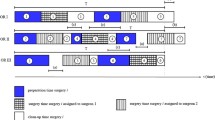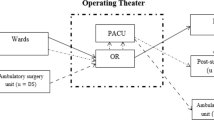Abstract
This research aims at supporting hospital management in making prompt Operating Room (OR) planning decisions, when either unpredicted events occur or alternative scenarios or configurations need to be rapidly evaluated. We design and test a planning tool enabling managers to efficiently analyse several alternatives to the current OR planning and scheduling. To this aim, we propose a decomposition approach. More specifically, we first focus on determining the Master Surgical Schedule (MSS) on a weekly basis, by assigning the different surgical disciplines to the available sessions. Next, we allocate surgeries to each session, focusing on elective patients only. Patients are selected from the waiting lists according to several parameters, including surgery duration, waiting time and priority class of the operations. We performed computational experiments to compare the performance of our decomposition approach with an (exact) integrated approach. The case study selected for our simulations is based on the characteristics of the operating theatre (OT) of a medium-size public Italian hospital. Scalability of the method is tested for different OT sizes. A pilot example is also proposed to highlight the usefulness of our approach for decision support. The proposed decomposition approach finds satisfactory solutions with significant savings in computation time.

Similar content being viewed by others
References
Agnetis A, Coppi A, Corsini M, Dellino G, Meloni C, Pranzo M (2012) Long term evaluation of operating theater planning policies. Oper Res Health Care 1(4):95–104
Augusto V, Xie X, Perdomo V (2010) Operating theatre scheduling with patient recovery in both operating rooms and recovery beds. Comput Ind Eng 58:231–238
Cardoen B, Demeulemeester E, Beliën J (2010) Operating room planning and scheduling: a literature review. Eur J Oper Res 201:921–932
Chaabane S, Meskens N, Guinet A, Laurent M (2008) Comparison of two methods of operating theatre planning: application in Belgian Hospital. J Syst Sci Syst Eng 17(2):171–186
Denton B, Viapiano J, Vogl A (2007) Optimization of surgery sequencing and scheduling decisions under uncertainty. Health Care Manag Sci 10(1):13–24
Dexter F, Traub RD, Macario A (2003) How to release allocated operating room time to increase efficiency: predicting which surgical service will have the most underutilized operating room time. Anesth Analg 96(2):507–512
Fei H, Combes C, Chu C, Meskens N (2006) Endoscopies scheduling problem: a case study. In: Dolgui A, Morel G, Pereira CE (eds) Information control problems in manufacturing. A proceedings volume from the 12th IFAC conference, vol. 3–Operational Research. Elsevier, Saint-Etienne, pp 615–620
Garey MR, Johnson DS (1979) Computers and intractability: a guide to the theory of NP-completeness. W.H. Freeman & Co., New York
Guerriero F, Guido R (2011) Operational research in the management of the operating theatre: a survey. Health Care Manag Sci 14(1):89–114
Guinet A, Chaabane S (2003) Operating theatre planning. Int J Prod Econ 85:69–81
Gupta D (2007) Surgical suites’ operations management. Prod Oper Manag 16(6):689–700
Holte M, Mannino C (2013) The implementor/adversary algorithm for the cyclic and robust scheduling problem in health-care. Eur J Oper Res 226(3):551–559
Italian Ministry of Health (2010) Piano nazionale di Governo delle Liste di Attesa (PNGLA 2010-2012). Italy. www.salute.gov.it/imgs/C_17_pubblicazioni_1571_allegato.pdf
Ivănescu VC, Bertrand JWM, Fransoo JC, Kleijnen JPC (2006) Bootstrapping to solve the limited data problem in production control: an application in batch process industries. J Oper Res Soc 57(1):2–9
Jebali A, Alouane ABH, Ladet P (2006) Operating rooms scheduling. Int J Prod Econ 99(1-2):52–62
Martello S, Toth P (1990) Knapsack problem: algorithms and computer implementation. Wiley, Chichester
Roland B, Di Martinelly C, Riane F, Pochet Y (2010) Scheduling an operating theatre under human resource constraints. Comput Ind Eng 58:212–220
Tanfani E, Testi A (2010) A pre-assignment heuristic algorithm for the Master Surgical Schedule Problem (MSSP). Ann Oper Res 178(1):105–119
Testi A, Tanfani E, Torre GC (2007) A three phase approach for operating theatre schedules. Health Care Manag Sci 10:163–172
Testi A, Tanfani E, Torre GC (2008) Tactical and operational decisions for operating room planning: efficiency and welfare implications. Health Care Manag Sci 12:363–373
Persson M, Persson JA (2006) Health economic modelling to support surgery management at a Swedish hospital. Omega 37:853–863
Pham ND, Klinkert A (2008) Surgical case scheduling as a generalized job shop scheduling problem. Eur J Oper Res 185(3):1011–1025
Sier D, Tobin P, McGurk C (1997) Scheduling surgical procedures. J Oper Res Soc 48:884–891
van Oostrum JM, van Houdenhoven M, Hurink JL, Hans EW, Wullink G, Kazemier G (2008) A master surgical scheduling approach for cyclic scheduling in operating room departments. OR-Spectrum 30:355–374
Acknowledgments
The research is supported by the grant “Gestione delle risorse critiche in ambito ospedaliero” (“Critical resource management in hospitals”) of the Regione Toscana - PAR FAS 2007-2013 1.1.a.3.- B51J10001140002.
The authors wish to thank the editor and two anonymous reviewers for their constructive comments that helped improve the paper.
Author information
Authors and Affiliations
Corresponding author
Rights and permissions
About this article
Cite this article
Agnetis, A., Coppi, A., Corsini, M. et al. A decomposition approach for the combined master surgical schedule and surgical case assignment problems. Health Care Manag Sci 17, 49–59 (2014). https://doi.org/10.1007/s10729-013-9244-0
Received:
Accepted:
Published:
Issue Date:
DOI: https://doi.org/10.1007/s10729-013-9244-0




